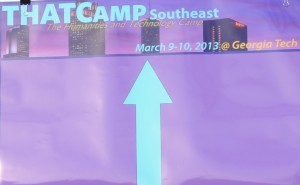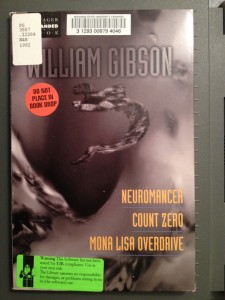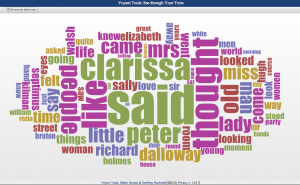 THATCamp Southeast 2013 is done and dusted. Thanks to everyone who took part! Lots of great discussion and collaboration. See you in 2014!
THATCamp Southeast 2013 is done and dusted. Thanks to everyone who took part! Lots of great discussion and collaboration. See you in 2014!
Mar
10
Goodbye and thank you!
Mar
10
Mar
09
THATCampSE13 Public Google Docs Folder
Hey all –
In the spirit of collaboration and working even past THATCampse13, I have created a public folder where we can all create, share, and contribute to/with each other via google docs.
The URL is here: docs.google.com/folder/d/0BxzwUZ6mHy6lNi1ZVFdiZ2FDak0/edit?usp=sharing
Please jump in and add/create a session you’re leading, so we can all participate.
Mar
09
Restricted Publishing: What Is It Good For?
I would like to examine, discuss, and debate the benefits of continuing to publish academic work behind pay walls, logins, or other restrictions. I understand that there are some — I just want to take the rhetorical position that there aren’t and see what happens. Some possible directions for the discussion are: institutional benefits, liabilities, issues of promotion and tenure, peer review processes, etc. Link to open Google Document notes here.
Some articles for context:
Giving It Away for Free: Sharing and the Future of Scholarly Communication | Kathleen Fitzpatrick
Publishing Outside the Academy | Audrey Watters
Is Open Access a Business or a Moral Issue? A Conversation with Penn State UP | Adeline Koh
Starter examples, please add more:
Hack Education
Journal of Digital Humanities
Journal of Interactive Technology and Pedagogy
Hybrid Pedagogy: A Journal of Teaching and Technology
Mar
09
It’s here!
 Good morning and welcome to THATCamp SE 2013!
Good morning and welcome to THATCamp SE 2013!
Just removed the Countdown Clock from the sidebar, which means we’re go for flight in 1 hour and 55 minutes!
We’re looking forward to an invigorating 28 hours, so … stay caffeinated. Don’t forget to disconnect your #Twitter account from your #FB account and keep your hands and feet outside the vehicle at all times.
Let’s get started!
Mar
08
Play Session Proposal: RetroComputing
 I would like to propose a play session on retrocomputing and platform studies. Hardware willing, I will bring two Macintosh Powerbooks from the early 1990s loaded with some software and an early, floppy disk-based ebook of William Gibson’s Sprawl trilogy. While playing with these old computers, we can talk about reading these kinds of texts (hardware, software, games, written texts) and strategies for preserving/accessing digital texts.
I would like to propose a play session on retrocomputing and platform studies. Hardware willing, I will bring two Macintosh Powerbooks from the early 1990s loaded with some software and an early, floppy disk-based ebook of William Gibson’s Sprawl trilogy. While playing with these old computers, we can talk about reading these kinds of texts (hardware, software, games, written texts) and strategies for preserving/accessing digital texts.
Mar
08
Literary Analysis & Data Visualization Tools
I often assign literary analyses that ask students to work with data visualization tools such as Wordle, Prezi, Google Maps, Voyant, and Many Eyes. While it’s fun to play around with literary texts in word clouds and word trees, it is much more difficult to use visualizations for an effective “distant reading” to use Franco Moretti’s term. In the brand new online MLA Commons publication Literary Studies in the Digital Age, Tanya Clement writes in the chapter on “Text Analysis, Data Mining, and Visualizations in Literary Scholarship”:
These [data visualization] methodologies defamiliarize texts, making them unrecognizable in a way (putting them at a distance) that helps scholars identify features they might not otherwise have seen, make hypotheses, generate research questions, and figure out prevalent patterns and how to read them.
I imagine this session as a combined Talk/Play session in which we discuss the benefits and pitfalls of using data visualizations in the literature classroom (and in our own research) and play with some of these tools to see if we can come up with new hypotheses, research questions, and interpretations of patterns. I’d also be happy to share what I learned about Voyant at this week’s DiSC workshop.
Mar
08
Can FOSSELs Fuel Sustainability?
With the economy in its current state, money -or the lack thereof- is a constant concern. The world of Higher Education is not immune to this problem, sadly. How do we create a model that’s sustainable and still provides the tools and education for the next generation of students to become part of the global community? What about technology as a lifeline?
FOSSELs (Free and Open Source Software Equipped Libraries) could point the way toward a potential source for shrinking expenses in a vital area: technology. By adopting a model that embraces Free and Open Source as its inspiration, Higher Ed institutions could explore lower operating expenses without sacrificing access to technology for students and faculty. Without the large expense of “brand-name” software, a significant amount of funding could be applied to the mission of education.
I have worked in a FOSSEL in my previous life in public libraries. The model, when properly implemented and maintained, has the potential to be a great asset with implications in all areas of education. Is there a real possibility that this could become a defining (or redefining) movement in education? If so, where does that movement start? What are the roadblocks to such an effort?
Mar
07
Proposal: Quizzes as Games
There is a bunch of stuff I want my students to know in my literature courses, but that I am not qualified or don’t want to teach- identifying countries on a map, translating key terms from other languages, grasping basic historical information, grammar. Is there a low-stakes, self-directed, automated, and (maybe even) fun way of doing this? I am proposing a Talk Session on developing and using online quizzes as games.
I’ve never used quizzes in my classes because I think there are far better ways to make sure students are engaged with the course content. However, I have come to accept that sometimes we do learn simply by rote memorization. Too often though, quizzes just seem punitive and pointless. You get one chance to get it right and then we move on. After attending Katie Salen’s 2012 SXSW session, “Don’t Shoot the Player While they are Learning,” I began to think about how I could gather and create quizzes that taught students material that I wanted them to know, but that I didn’t want to spend class time on. Also, I wanted to figure out how to make the quizzes feel like a low stakes game. My approach:
- Students would not be graded on how well they did on any particular quiz. They got a small number of points by taking any quiz 10 times over a period of at least 3 weeks.
- Students didn’t have to take the quizzes. They had many choices for assignments and could decide for themselves how to get points for the course.
- All of the quizzes were self directed, outside of class, and automated.
I was teaching courses on Contemporary American Ethnic Literature and Comics. The initial quizzes I linked to or created were:
- A brief Spanish quiz using quotations from Junot Diaz’s Drown
- A bunch of online regional map quizzes
- A grammar quiz I helped create
Students could create quizzes as one of their assignments. Some of the best ones I combined and let the other students take for points:
- An image-based quiz on Scott McCloud’s theories in Understanding Comics
- A culture, language, and history quiz for Maus
Some possible questions for the session:
- For what types of material is this quiz approach to learning effective?
- Could we create a massive bank of quizzes that students could access on their computers or mobile devices?
- What are possible problems with this approach?
- How would you assess the effectiveness of this approach?
Mar
07
Technology in the Graduate Classroom
Much of the conversation on the utilization of technology in the classroom revolves around undergraduate classes, but in this Talk session, I’d like to discuss whether graduate students can or should likewise be asked to use Twitter, ebooks, blogs, Premiere, etc. in their seminars. Should graduate students create posters about Derrida, for instance, or digital stories about a Dostoevsky novel (or a historical, political, sociological text, depending on the discipline)? Practicing the use of particular tools can certainly help graduate students shape their assignments for the undergraduate classes they are set to teach, but many graduate students might (understandably) be wary of the prospect of devoting less time to writing traditional papers.




Recent Comments